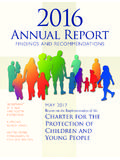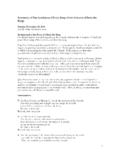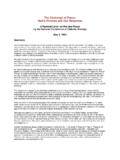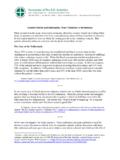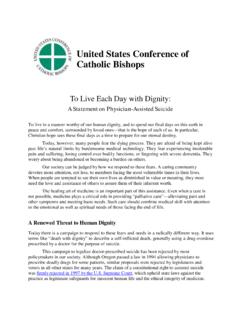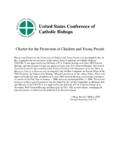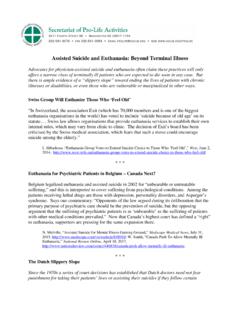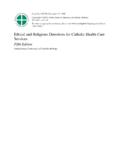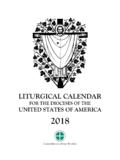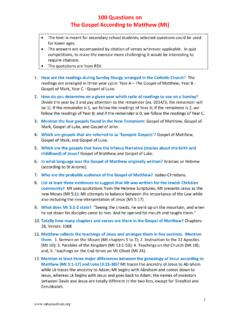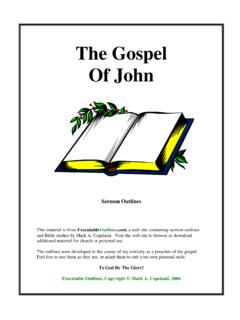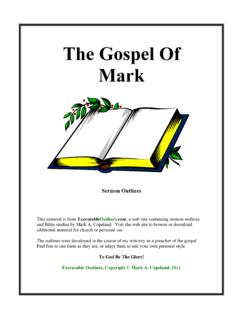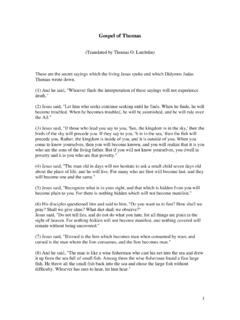Transcription of The Gospel of Life - USCCB
1 COMPENDIUMU nited States Conference of Catholic BishopsSecretariat of Pro- life ActivitiesThe Gospel of LifeEvangelium vitaeThe Gospel of life | COMPENDIUM | 2 What follows are summaries of each of the 105 numbered paragraphs of Evangelium vitae, prepared by USCCB s Secretariat on Pro- life Activities, to serve as a resource on and introduction to this great encyclical. Most of the italics are added by the Secretariat for Gospel of life (Evangelium vitae)COMPENDIUMThe Gospel of life | COMPENDIUM | 3 BACKGROUND Pope St. John Paul II was born Karol Wojty a in Poland in 1920. The youngest of three children, he faced great suffering, loss, and hardship in his early life .
2 His elder sister had died in infancy, his mother and brother by the time he was 12, and his father when he was only 20. He witnessed firsthand the invasion and occupation of Poland by German forces, the rise of communism, and the scourge of Nazism. During the Second World War, the young Wojtyla began studying for the priesthood in an underground seminary and was ordained in 1946. He was elected Pope in 1978 and served as the Bishop of Rome until his death on April 2, 2005. His 27-year pontificate is among the longest in the Church s history. As Pope, he visited 129 countries, canonized 482 saints, and wrote 14 encyclicals, including Evangelium vitae (The Gospel of life ).
3 He was canonized by Pope Francis on April 27, 2014, and his feast day is celebrated on October 22, the anniversary of the inauguration of his twentieth century witnessed some of the greatest assaults on human dignity in history, including multiple world wars, the Holocaust, and the advance of legalized abortion and euthanasia. Promulgated in 1995, on the eve of a new millennium, Pope St. John Paul II s Gospel of life sought to counter the spread of such unprecedented threats to human life and combat the culture of death. Despite such grave threats to human life , John Paul II vigorously proclaimed the good news of the value, sacredness, and dignity of every human life in every stage and circumstance.
4 His landmark, pro- life encyclical continues to offer prophetic insights for the Church s efforts to build a culture of life and civilization of Gospel of life | COMPENDIUM | 4 INTRODUCTION1 The Gospel of life is at the heart of Jesus saving mission, to be preached as good news to all people. In taking on human flesh and coming to Earth, Christ reveals the full meaning of every human birth and the dignity of all human is created to share in the very life of God. This eternal destiny reveals the immeasurable value of the human person, and the sacredness of earthly life . The dignity of human life from beginning to end can be recognized by every person open to truth and goodness, but Christians are particularly entrusted with its protection.
5 The Gospel of God s love for man, the Gospel of the dignity of the person and the Gospel of life are a single and indivisible threat to human life is a threat that Mother Church feels in her very heart. In addition to the ancient scourges of poverty, hunger, disease, violence and war, new threats to human life are emerging on an alarming scale. Whatever is opposed to life itself, violates the integrity of the human person, or insults human dignity poisons human society and is a dishonor to the , scientific and technological developments have given rise to new forms of attacks on human dignity. At the same time, there is a new cultural climate developing in which certain crimes against life are justified in the name of the rights of individual freedom.
6 The failure to punish and instead legalize such practices is both a symptom and cause of grave moral decline in our world. Consciences are finding it increasingly difficult to distinguish between good and evil in what concerns the value of human encyclical was written in response to a request from the Cardinals that the value and inviolability of human life be reaffirmed with the authority of the Successor of Peter. Just as the Church spoke out against injustices suffered by the working classes a century ago, now she must speak out on behalf of the great multitude of weak and defenceless human beings, unborn children in particular, whose fundamental right to life is being trampled upon.
7 This encyclical is a pressing appeal to every person: respect, protect, love and serve life , every human life !6I pray that the family will always remain the sanctuary of life , 1 in accordance with God s plan. All members of the Church are called to offer the world new signs of hope, to work to ensure that justice and solidarity will increase and that a new culture of human life will be affirmed, for the building of an authentic civilization of truth and Gospel of life | COMPENDIUM | 5 CHAPTER 1 Cain rose up against his brother Abel, and killed him (Gen 4:8): the roots of violence against life 7 God did not make death, but rather created man in his image for a destiny of full and perfect life .
8 Death came into the world as a result of the devil s envy (cf. Gen 3:1,4-5) and the sin of our first parents (cf. Gen 2:17, 3:17-19). The first murder occurred violently in the killing of Abel by his brother Cain. [This biblical account can be found in Gen 4:2-16.]8In freedom, Cain chose to give into the temptations of envy and anger, killing his own brother. Every murder is similarly a violation of the spiritual kinship uniting mankind in one family. This killing at the dawn of human history is a sad witness of how evil spreads with amazing speed. Cain refuses to accept responsibility for his sin with the question, Am I my brother s keeper?
9 (Gen 4:9). This pattern continues throughout human society today as ideologies try to justify and disguise the most atrocious crimes. 9 The blood of Abel cries out for justice. God cannot leave such a crime unpunished. life belongs to God alone; therefore, whoever attacks human life , in some way attacks God himself. Yet paradoxically, God is merciful even when he punishes for not even a murderer loses his personal dignity. God protects Cain from those seeking revenge, desiring not his death, but rather his VOICE OF YOUR BROTHER S BLOOD CRIES TO ME FROM THE GROUNDP resent-Day Threats to Human Life10 God s question to Cain, What have you done?
10 (Gen 4:10), is also addressed to the people of today, for human history has been marked by attacks on life . Some threats come from nature itself, but are made worse by culpable indifference and negligence. Others are of human origin, such as murder, war, poverty, and category of attacks specifically threaten life at its earliest and at its final stages, striking at the time of life s greatest frailty when it lacks any means of self-defense. Often such attacks are no longer considered crimes, but instead assume the nature of rights. A profound crisis of culture has created scepticism about the foundations of knowledge and ethics. In a complex society, people are often left alone with their problems, which include situations of acute poverty and instances of violence, especially against women.
